- The Special Association of the Region for Waste Management (EDSNA) admits in its balance sheet for 2022 a loss of 38.1 million euros, just for 2022!
- They ignored the warnings of 66 mayors of Attica who sounded the alarm about Patoulis’ pharaonic waste programs.
- The long list of 135 direct awards for 2022 and 2023 alone, amounting to 3,904,859.47 euros, signed by Patoulis.
- Party with fictitious tenders and record waste.
- Five million euros for decontamination, 6.93 million euros for two dozen studies.
- EDSNA without leadership. Hardalias’ appointee, Babis Siatras, was also the Director General of the New Democracy parliamentary group and spent more hours in parliament than in EDSNA’s offices.
By Aris Hadjigeorgiou
The government is trying to hide a “black hole” of 200 million euros in Attica’s garbage. Just a few days ago, in April 2024, the region’s special association for waste management, EDSNA, managed to publish a balance sheet for 2022 in which it officially admits a loss of 38.1 million euros. However, this is only a small part of the gap left by the administration of Giorgos Patoulis, since amounts withheld by the institution when they did not belong to it are added, as well as several contracts that have not secured financing.
The government, which last July “cut off” Mr. Patoulis from a second term as governor of Attica under the pretext of a “zeibekiko”, is now looking for ways to cover the huge deficit, as it was the government that covered him during his term. At the same time, the new regional governor, Nikos Hardalias, seems indecisive about how to deal with the problem. While he has announced audits of the region’s and EDSNA’s finances by chartered accountants, the procedures followed so far seem extremely lengthy.

An indication of the prevailing disarray is the fact that six months after the October 2023 local elections, EDSNA remains essentially without leadership. Nikos Hardalias appointed Babis Siatras as the organization’s president, who was elected as a regional councilor alongside him. However, until recently, Mr. Siatras remained both General Director in the New Democracy parliamentary group and spent more hours in Parliament than in the EDSNA offices.
Thus, the 2022 balance sheet was approved with a significant delay on April 11, 2024, by a body, the Executive Committee (EC), in which 5 out of 7 members appear with roles that are no longer valid with the October 2023 elections. In particular, they appear to vote unanimously:
(pdf HERE)
- Evangelos Bournous, as Mayor of Rafina
- Nikos Chiotakis, as Councillor of the Municipality of Kifisia
- Dimitris Bouraimis, Municipal Councillor of Fyli
- Ioannis Smeros, Regional Councillor of Eastern Attica
- Eleftherios Kosmopoulos, Deputy Regional Governor of Western Attica
The above roles were valid from the 2019 elections, and based on these, these specific individuals were appointed as members of the EC of EDSNA, which operated during the tenure of G. Patoulis. However, Ev. Bournous was not re-elected as mayor of Rafina in 2023, N. Chiotakis and E. Kosmopoulos were elected as regional councilors, D. Bouraimis was not elected as a regional councilor, and I. Smeros was a parliamentary candidate for PASOK. Only two of the seven members hold valid positions, namely President B. Siatras and the Mayor of Fyli, Christos Pappous.
Waste management in a metropolis is one of the most critical issues, as it affects the health of millions of residents. EDSNA has been operating in its current form since 2011, under the “Kallikratis” law. Governments during the first memoranda left Attica’s 66 municipalities in charge of paying for their waste to be buried, and gave absolute power to the elected regional governor – ostensibly to speed up the planning and implementation of new projects. Thirteen years later, Attica’s solid waste, about 1.8 million tons per year, continues to be buried in Fyli as recycling remains stagnant at very low rates.
Collapse course
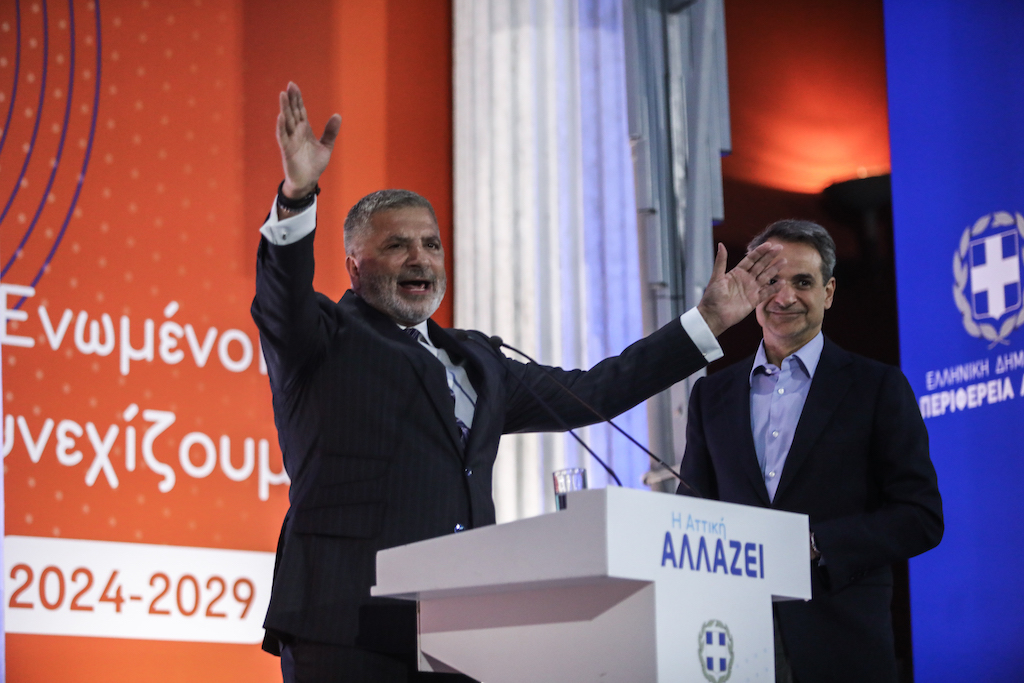
(ΓΙΑΝΝΗΣ ΠΑΝΑΓΟΠΟΥΛΟΣ/EUROKINISSI)
However, EDSNA as an organization has secured income from the fees paid by the municipalities after first collecting them from the citizens through electricity bills. In all previous years, EDSNA managed not only to cover its expenses, but also to build up a significant reserve. Let’s see how the collapse of its finances results from the table summarizing the results as published in the balance sheets of the years 2020, 2021, and 2022.

Revenue: Revenue remains relatively stable in the years up to 2021, ranging between about 93 and 96 million euros. In 2022, there is a peculiar increase to 130.3 million euros. The origin of this increase will be discussed below.
Expenses: Expenses (cost of goods sold) started at 85.8 million euros in 2019, the year when the region and EDSNA were handed over to G. Patoulis from the administration of Rena Douros. The following year, they increased to 104 million, to 116.5 million in 2021, and to 172.6 million in 2022, twice as much as in 2019.
Operating result: 2020 was also the last year in which EDSNA had a positive operating result of 1.8 million euros, but this was supplemented by the huge result of 34.6 million euros in the previous year. Thus, in 2020, a surplus of 36.4 million euros was recorded. In 2022, on the other hand, the operating result is negative at -38.1 million euros, and with the remaining amount of 6.1 million euros, a final deficit of -32 million euros is recorded for the first time.
Retention of revenues
It is impossible to see the deeper causes of the collapse from a balance sheet. If we focus on the presentation of the results of operations for 2022, we can easily identify some indications:
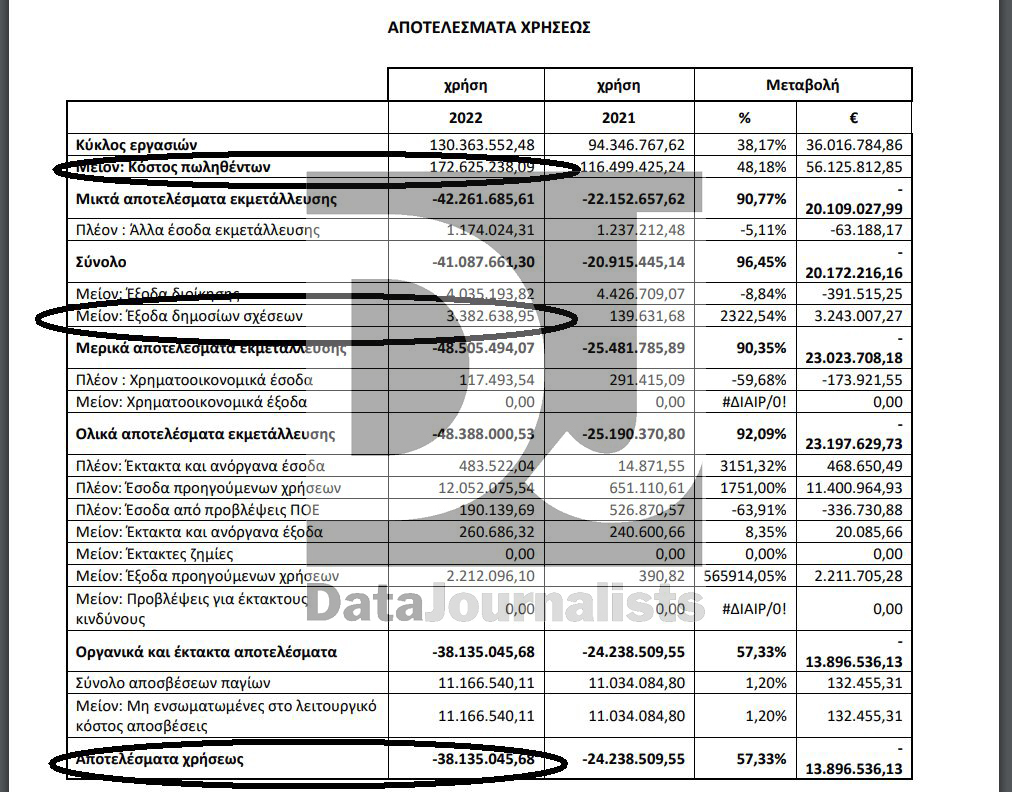
Here the increase in revenues of 36 million euros is more clearly visible. The source of this revenue is not specified, but according to the information available, it consists largely of money collected by EDSNA from municipalities, which should have been transferred to the Hellenic Recycling Agency.
These are revenues from the environmental fee or landfill tax, which is supposed to reduce the amount of waste sent to landfills. Until 2021, municipalities in Attica paid 54 euros per ton for disposal at the Fyli landfill. Beginning in 2022, an additional landfill tax of 20 euros per ton will be levied, increasing by 5 euros in subsequent years. The amount of 36 million euros corresponds exactly to the amount of 1.8 million tons buried. However, the amount paid by the municipalities was not transferred to the Hellenic Recycling Agency as required by the Landfill Tax Law but was retained by EDSNA. This means that a way has to be found to get this amount out of EDSNA’s coffers. It’s like a company withholding VAT collected from the sale of services, except that in the case of EDSNA, the strict procedures applicable to such cases have not been initiated. Because of this “pending issue”, EDSNA’s deficit won’t stay at 38.1 million euros but will approach 75 million euros. And this before the end of 2022.
What’s even harder to detect is the increase in expenses of 56.1 million euros, or 48.1%, which caused the final deficit despite the withheld revenues. The increase in expenses for public relations stands out at 2322.54%, although it doesn’t justify the bloating of expenses. Mr. Patoulis remains the “master of public relations”, but the allocation of 3,383,638.95 euros in 2022 (compared to only 139,631 in 2021) cannot justify the increase. It’s simply staggering when you consider that this is an organization that deals primarily with waste disposal.
Contracts without funding
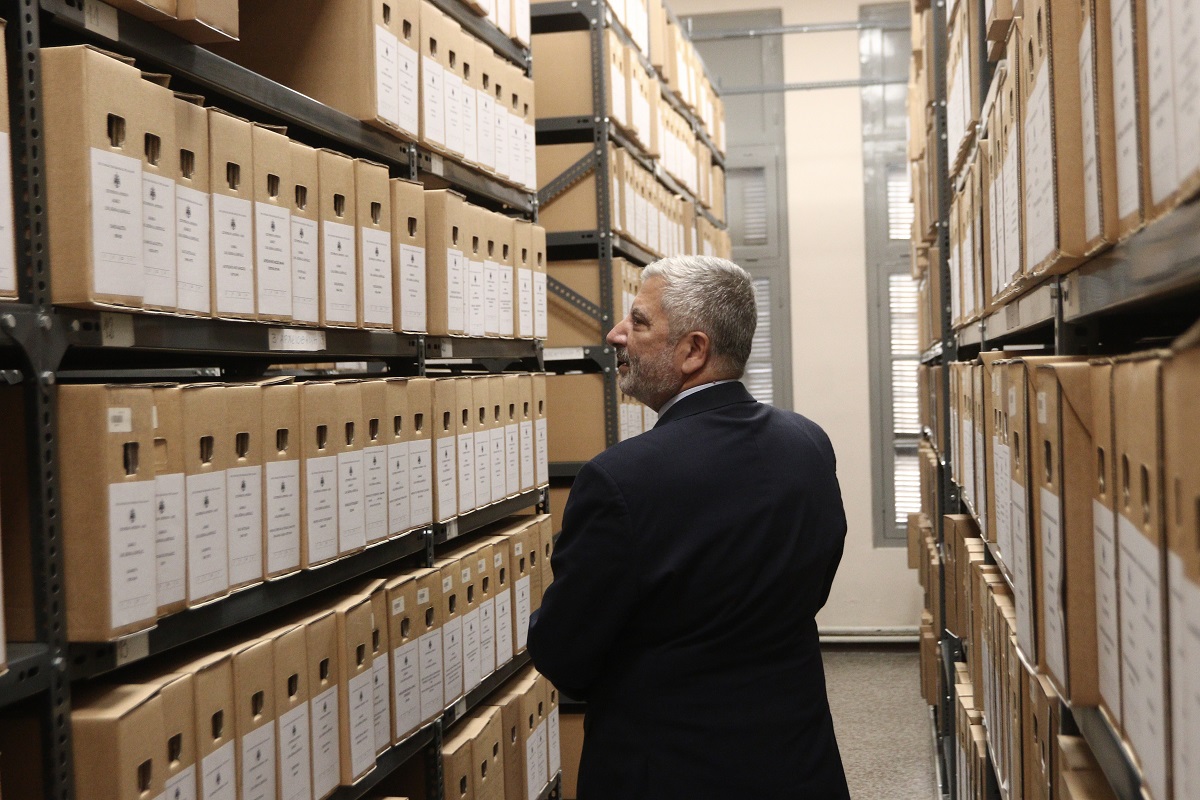
Sources familiar with the waste management sector attribute the apparent financial collapse of EDSNA mainly to the fact that the Patoulis administration continued to make commitments and announce various programs without securing funding from the government. The implementation of these commitments is not reflected in the financial statements but has been highlighted in the past as a major problem by the 66 mayors of Attica. An organization representing these mayors is the Regional Union of Municipalities of Attica (PEDA), in which New Democracy members also dominate. However, this has not prevented PEDA’s Environment, Energy, and Waste Committee from pointing the finger at the root of the problem for years. Let’s see what was noted in the minutes of its meetings:
- On 8/11/2022 it is reported: “Recently, EDSNA has spent nearly 300 million euros on 13 tenders for the procurement of equipment for the implementation of source sorting programs, as well as for the procurement of mobile equipment for the biowaste collection program through financial leasing. In 8 of these tenders, for a total of 190 million Euros, only one company participated, while in the other 5, for a total of 110 million Euros, the participating companies, except for the final contractor, were excluded from the process, resulting in an average discount of 2.2% on the almost 300 million Euros spent. Regarding the equipment and programs that were auctioned, the entire committee agreed that they constitute a waste of municipal funds, as the equipment is inappropriate and unsuitable, while the implementation methodology of the program is completely misguided, failing source separation and biowaste collection in most municipalities of Attica – those that follow the guidelines of EDSNA.

- At another meeting, on 6/4/2021, amid the pandemic, the PEDA committee discovered enormous waste. Five million euros for sanitation contracts. A commitment of 6.93 million euros, 8% of the budget, for 24 study contracts. This was supposed to be the start of the big SWM (Solid Waste Management) projects in Schisto and Fyli, as well as in Grammatiko, with a total budget of about 1 billion euros. These tenders are still pending today, but the commitments are still valid. The mayors also mentioned a “series of tenders and contracts” with a total value of €447.8 million, to be financed by EDSNA, but “whose costs will be borne mainly by the municipalities”. These tenders include Procurement of equipment for source sorting (€223 million), procurement of ten weighing corner recycling teams (€112 million), procurement of biowaste collection equipment (€44 million), procurement of bin placement-weighing-identification (€29 million), procurement of bins (€4.7 million), maintenance and repair of recycling equipment (€20.3 million), transformation of the recycling plant in Fyli into a “green factory” (€129 million), etc. The mayors also identified overpricing in the procurement of biowaste collection vehicles. As they reported, the cost per vehicle, which was €219,000 in 2018-2019, has now risen to €310,000 for leasing.
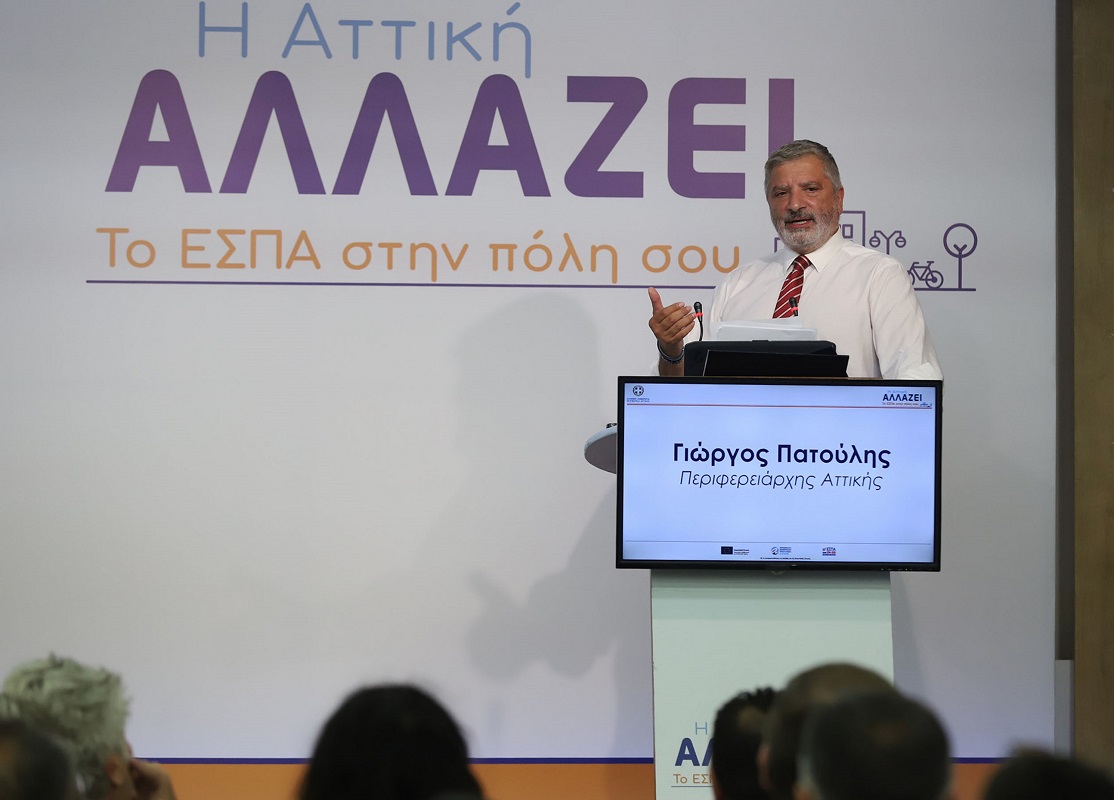
- On 23/9/2021, the PEDA committee discussed the EDSNA contract for the “upgrading” of recycling residues. Most of the recycling is done through the blue bins, where large quantities of materials accumulate that are not recycled and have to be buried with the general waste in landfills. The entity that we finance as EDSNA but cannot manage,” says the PEDA committee, “will pay 13,717,500 euros over the next 5 years to divert 90,000 tons of blue bin residues from landfills over the 5 years. This is €152 per ton (plus electricity and water paid by EDSNA), while the contractor will receive from the municipalities at its doorstep the materials resulting from EDSNA’s source separation program – up to 50,000 tons over 5 years – and will pay EDSNA €10 per ton, The contractor itself will receive an average of €250 per ton (the average price of recyclable materials over the last 10 years), plus the subsidy from the Hellenic Recovery Recycling Corporation (HERRCO) (which manages the blue bins). Thus, EDSNA will lose income (average prices of recyclable materials over the last 10 years) of approximately 240×50,000 = 12,000,000 € over the 5 years in favor of the contractor.
Rain of direct award
(pdf HERE)
To the chaotic situation that G. Patoulis left behind, a long list of direct awards for each occasion is added. Data Journalists presents a table with 135 such assignments for the years 2022 and 2023 only, with a total cost of €3,904,859.47. This results in an average cost per project of €30,000, which is just below the limit for awards without prior competition. It is recalled that the Mitsotakis government raised this limit from €20,000 to €30,000.
Of course, among this multitude of projects, there may be some that were indeed necessary due to urgency or high specialization. However, €24,500 (excluding VAT) for “the creation of a radio spot for a theatrical performance aimed at promoting recycling” clearly suggests wasteful spending, especially when there are recycling organizations and the Ministry of Environment and Energy that also allocate funds for such purposes. As for the other contracts, a look at the titles of the items will answer many questions about the financial results.
Suspicion of collusion
The cover-up of the economic collapse is not only due to the delay in the approval of the balance sheets and the avoidance of placing the management in the EDSNA. On 7/2/2024, the draft budget for 2024 is published on the Diavgeia portal of the EDSNA, which had been approved 70 days earlier (29/11/2023) by the Executive Committee. Magically, this budget appears to be completely balanced with a revenue-expenditure of €165,087,751.95. According to information, this budget, which was sent to the Ministry of the Interior for approval, remains buried in some drawer because officials refuse to approve it.
Double payment
However, the Ministry of the Interior made another mistake. With its decision of 15/12/2023, it paid the Hellenic Recycling Agency the money that EDSNA did not allocate from the 2022 waste disposal fee! In other words, in order not to force the EDSNA to pay the amount of 36 million euros and not to leave the contractors-suppliers unpaid or the garbage unburied, the government paid and charged a second time to the municipalities that had already paid. This decision was intended to “silence” those protesting and give the government time to decide how to handle the situation.
The Ministry of the Interior’s decision is full of strange discrepancies that suggest a “disappearance” of waste from certain municipalities. Data Journalists compared the amounts of waste reported in the ministerial decision for 2022 with the amounts per municipality approved by EDSNA for 2020. The comparison shows that 48 out of 66 municipalities show small deviations in quantities – which is normal, as recycling generally remains at the same low level.
However:
- Two regional municipalities, Marathon and Megara, seem to have almost no waste. Marathon goes from 19,915 tons in 2020 to 868 tons in 2022. And Megara from 15,858 tons to 850! Is this perhaps a favoritism, so that the double charge “hurts” less?
- However, the paradoxes continue. Alimos appears with only 2,960 tons in 2022 (compared to 22,424 tons in 2020) and the municipality of Nikaia-Rentis with 8,288 tons compared to 48,253 tons in 2020. Four municipalities (Aegina, Dafni-Ymittos, Keratsini-Drapetsona, Korydallos) show a 75% reduction in waste! Five others (Agios Dimitrios, Elefsina, Markopoulo, Perama, Salamina) show a 66% reduction and five more (Aigaleo, Kallithea, Moschato-Tavros, P. Faliro, Chaidari) seem to have disappeared 50% of their waste.
Enlargement of the “black hole”
Based on the limited publicly available data, it is estimated that the 2022 picture will be repeated in 2023 and also in 2024, which is already approaching the second quarter. If 2022 closes with an opening of 75 million euros, commitments will lead to new deficits. At the same time, the new NSRF does not provide funding for projects as previous programs did. This creates the nightmare of a total “black hole” that will reach 200 million euros by the end of 2024.
Managerial control
The decision of the Regional Council has so far covered the administration of Hardalias, taken at the end of January, for a general management audit of the actions of the Patoulis administration. According to the decision, the audit will be carried out by chartered accountants and will cover the financial years 2020-2023 for both the Attica Region and EDSNA. As announced at the time, the results of the audit will be announced three months after its completion. But when will this completion be achieved to cover even the year 2023, when the financial statements for 2022 have just been approved? Will it be in time to prevent a complete collapse, especially in EDSNA, which has to pay the contracts to the contractors to keep the waste disposal going? Will the citizens of Attica avoid additional municipal fees to cover the “black hole”? The government may not want to hang its former favorite, G. Patoulis, for fear that its involvement in irregularities will be revealed. As for the prosecutor’s office and other auditing bodies, such as the National Transparency Authority, will they ever decide to deal with the “treasure hidden in the garbage”?

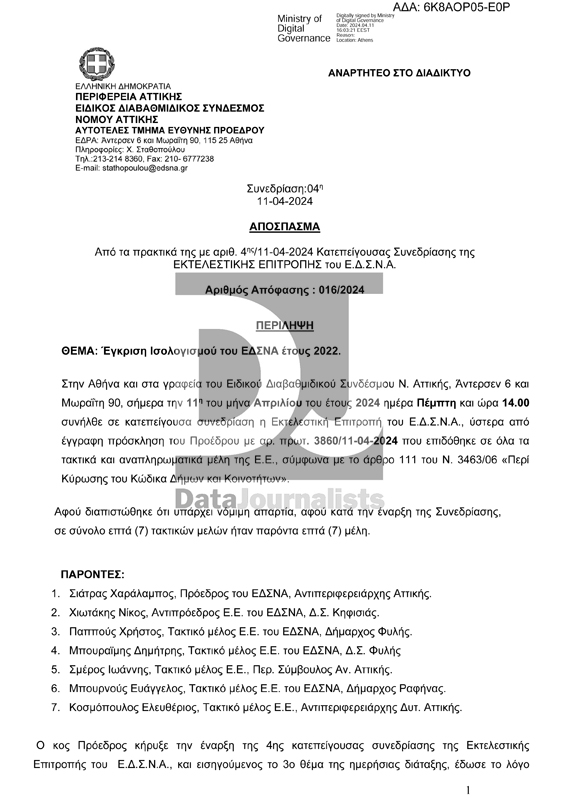
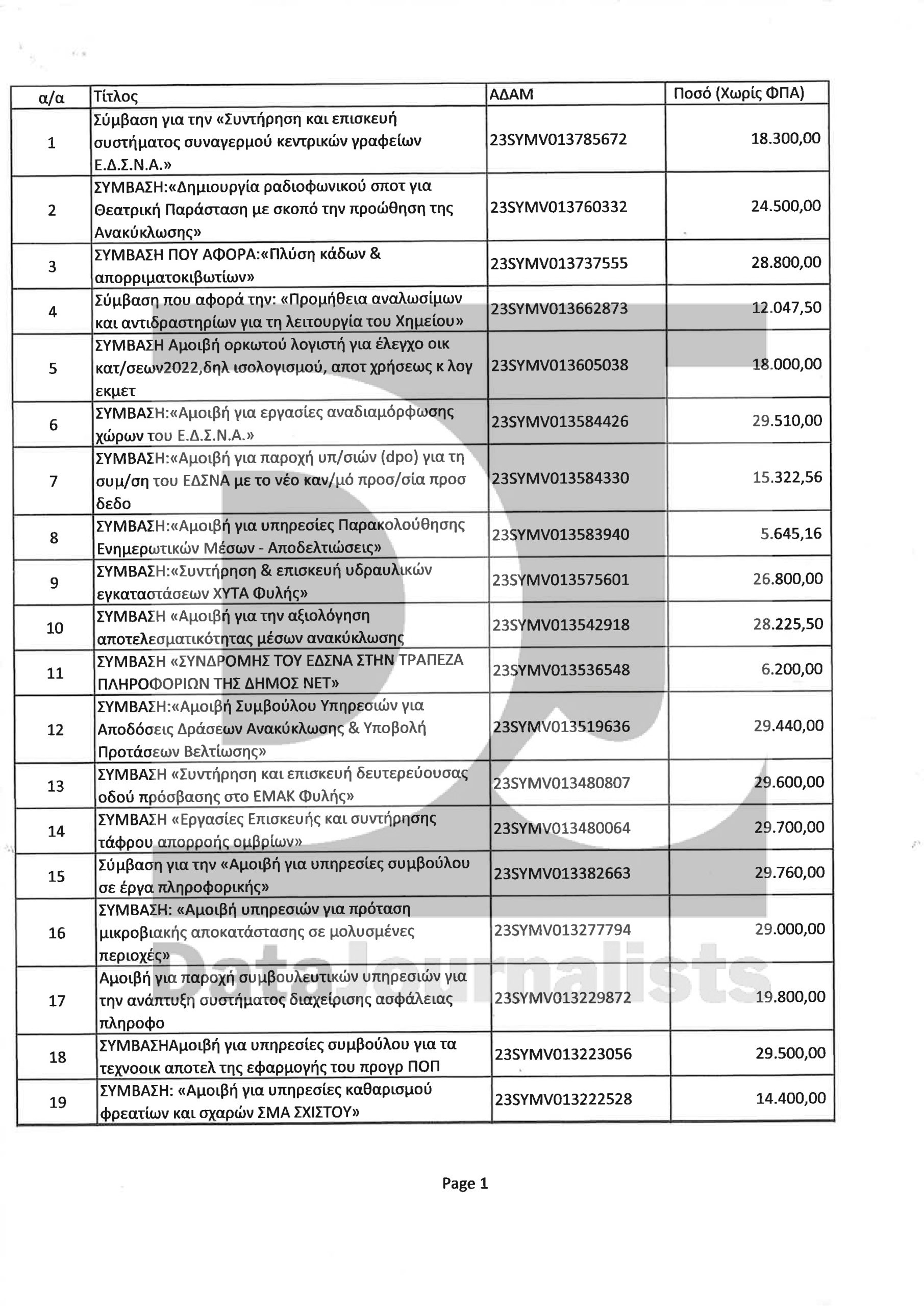



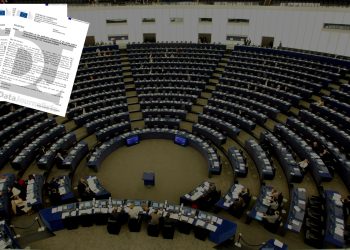




Discussion about this post